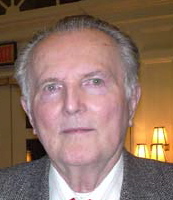Profiles in Research Author(s): Arthur Jensen, Daniel H. Robinson and Howard Wainer, Journal of Educational and Behavioral Statistics, Vol. 31, No. 3 (Autumn, 2006), pp. 327-352
Contexto: [Interview: Responding to a question about whether it was smart to publish his 1969 article at the time he did] In retrospect, however, I would hope that I would not have changed a thing in that article, even if I had been able to imagine the supposed "storm" it caused. I will be ashamed the day I feel I should knuckle under to social-political pressures about issues and research I think are important for the advance of scientific knowledge.
Arthur Jensen: Frases en inglés
Fuente: Differential Psychology: Towards Consensus (1987), p. 424
Contexto: I had begun by trying, for the sake of scholarly thoroughness, merely to write a short chapter for my book on the ‘culturally disadvantaged’ that I expected would succinctly review the so-called nature-nurture issue only to easily dismiss it as being of little or no importance for the subsequent study of the causes of scholastic failure and success. I delved into practically all the available literature on the genetics of intelligence, beginning with the works of the most prominent investigator in this field, Sir Cyril Burt, whom I had previously heard give a brilliant lecture entitled The Inheritance of Mental Ability’ at University College, London in 1957. The more I read in this field, the less convinced I became of the prevailing belief in the all-importance of environment and learning as the mechanisms of individual and group differences in general ability and scholastic aptitude. I felt even somewhat resentful of my prior education, that I could have gone as far as I had—already a fairly well-recognized professor of educational psychology—and yet could have remained so unaware of the crucial importance of genetic factors for the study of individual differences.
Fuente: Differential Psychology: Towards Consensus (1987), pp. 430-1
Contexto: The key theme in Gordon’s chapter, that lends it theoretical coherence, is his clear perception that the guiding force in my own work in mental measurement arises principally from my constant search for construct validity that can embrace the widest range of phenomena in differential psychology. In my philosophy, science is an unrelenting battle against ad hoc explanation. No other field in psychology with which I have been acquainted has been so infested by ad hoc theories as the attempts to explain social class, racial, and ethnic group differences on various tests of mental ability. My pursuit of what I have called the Spearman hypothesis (Jensen, 1985a), which is nicely explicated by Gordon, represents an effort to displace various ad hoc views of the black-white differences on psychometric tests by pointing out the relationship of the differences to the g loadings of tests, thereby bringing the black-white difference into the whole nomothetic network of the g construct. It is within this framework, I believe, that the black-white difference in psychometric tests and all their correlates, will ultimately have to be understood. Understanding the black-white difference is part and parcel of understanding the nature of g itself. My thoughts about researching the nature of g have been expounded in a recent book chapter (Jensen, 1986b). Enough said. Gordon’s chapter speaks for itself, and, with his three commentaries on the chapters by Osterlind, Shepard, and Scheuneman, leaves little else for me to add to this topic.
Arthur Jensen, "The Debunking of Scientific Fossils and Straw Persons" http://www.mugu.com/cgi-bin/Upstream/jensen-gould-fossils Contemporary Education Review 1:2, 1982
Fuente: Differential Psychology: Towards Consensus (1987), p. 424
Fuente: The g factor: The science of mental ability (1998), p. 270; As cited in: Melissa A. Bray, Thomas J. Kehle (2011) The Oxford Handbook of School Psychology. p. 65
p. 258
Fuente: Differential Psychology: Towards Consensus (1987), pp. 438-9
Fuente: Differential Psychology: Towards Consensus (1987), p. 443
Fuente: Differential Psychology: Towards Consensus (1987), p. 448
Fuente: Differential Psychology: Towards Consensus (1987), p. 424
p. 82 of How Much Can We Boost IQ and Scholastic Achievement? (1969) https://en.wikipedia.org/wiki/How_Much_Can_We_Boost_IQ_and_Scholastic_Achievement%3F, the invited paper that created much hostility towards Jensen.
